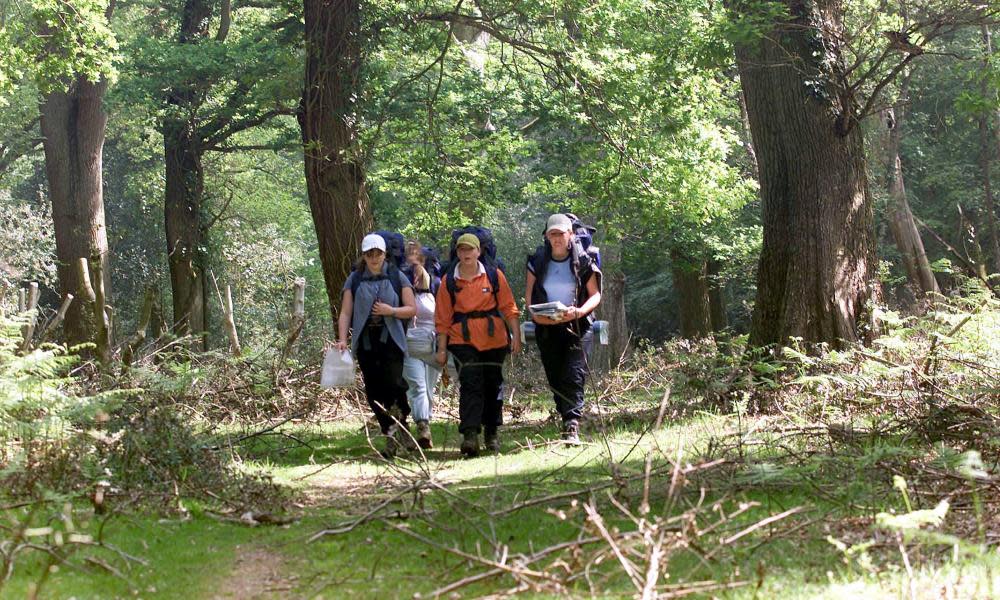The DofE award changes show you don’t have to climb a mountain to build character

Do you really have to suffer to “build character”? This narrative was particularly pervasive during the slog of my secondary school years – and never more so than when my teachers talked about the Duke of Edinburgh award. The scheme, which is aimed at 14- to 24-year-olds, centres on the idea of “personal development”, and certainly pushed students to their limits when I was at school. Gaining the certification – split into sections of “skills”, “physical”, “volunteering” and “expedition”, – demanded months of work and hobby-building. But the DofE’s bronze-level main event was the gruelling, day-long expedition.
I’ll never forget when my sister and her friends in the years above me participated. The day after the trek she asked to stay home sick, and when I got to school her friends were a mass of anguished groans, achy arms and wobbly thighs. When my time came to sign up, I was told the award would look great on my university personal statement – like so many other unappealing activities, such as attending talks, giving classroom tours, joining chess club, that teenagers are faced with in the later phase of school. But it was a firm no from me.
We should interrogate the diverse and myriad ways we can build inner strength and resilience
In Louis Sachar’s young adult novel, Holes, a group of boys are sent to a youth correction camp in the desert where they are forced to do manual labour in the sweltering heat all day, to no end. Now, when I think of “character development”, the repetitive mantra of the camp warden rings in my ears: “Digging holes builds character.” Last week, however, based on a survey of 4,000 people, the DofE award released an “experience list” for teenagers that turns on its head the idea that personal development requires extreme exertion, even pain. Calling on the government to make sure all schools are “adequately resourced for character education”, the guide suggests that small but meaningful activities such as campaigning for something you believe in, learning a language, becoming a mentor to someone younger, or going dancing, can build “strength, resilience and character”.
While broadly defined concepts such as these should be treated with a healthy dose of scepticism (as should anything associated with the royals), as someone who’s just moved out of the DofE award’s age bracket I agree that all young people can benefit by involvement in this new list of activities, which feel more like PSHE than PE.
Young people are increasingly reported to lack confidence – one study found that 41% of boys and young men, and more than half of girls and young women, worry about “not being good enough in general”. There are systemic issues that see these problems become pathological, such as the cuts to school funding and the difficulty in accessing youth mental health services – and these must be addressed. And even the head of Ofsted has warned that schools are increasingly resembling “exam factories” that fail to provide young people with a decent grounding in a broad range of subjects.
Yet though increased participation in personal development activities will not fix issues that stem from government austerity, we should wholeheartedly support young people (and people of all ages) in pursuing everyday endeavours that are wide-ranging and experimental, and give them a chance to learn about themselves.
Related: DofE scheme draws up 'experience list' to build teen resilience
For some it might be easier to participate in these new challenges, which are both holistic and suggest that opportunities for personal development can be found all around us – not just up a mountain. The DofE’s varying expeditions are significant events that may physically hurt – such a trip can be exciting, giving us the chance to test the limits of our body (it’s perhaps not a surprise that the award’s original director was John Hunt, who led the first successful ascent of Mount Everest in 1953). But we should also interrogate the diverse and myriad ways we can build inner strength and resilience, whether that’s – as the list suggests – through public speaking, going to a festival, befriending elderly people or creating a piece of art. Building a fulfilling life and learning about ourselves requires a well-rounded and sometimes resourceful approach that pushes us beyond our normal routines – and that applies whether we’re in school, university or the world of work.
Developmental psychologist Ann Masten devised the theory of “ordinary magic”: she suggests there are many ways for young people to develop resilience through the challenges they encounter in their everyday lives. She describes a central element of this as “mastery motivation”, whereby we find pleasure in being in control. Masten says that teachers, parents and anyone who works with young people should “create opportunities for successful mastery experiences” – gradually allowing young people to grow, learn and feel a sense of proficiency in the way they interact with the world. The idea has always stuck with me – that threading a few small but meaningful challenges throughout your everyday life can change the way you look at the world and at yourself.
That sense of mastery comes from pushing yourself in a safe and controlled environment. This doesn’t need to mean just physical or academic, but also in our emotions and values, as well as social and political experiences. Although it might still not be for me, I’ll admit there is much that can be gained from expeditions and orienteering: the physical act of going out into the world and exploring unfamiliar territory. But this holds true in the metaphorical sense too: opportunities to flourish and build character can be found in unexpected places, and sometimes they’ll be more accessible than we previously realised.
• Micha Frazer-Carroll is opinions editor at gal-dem.com


